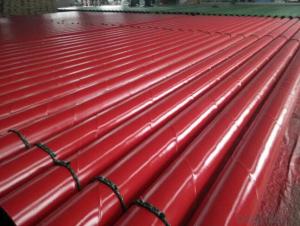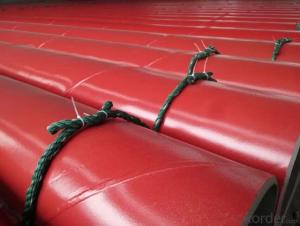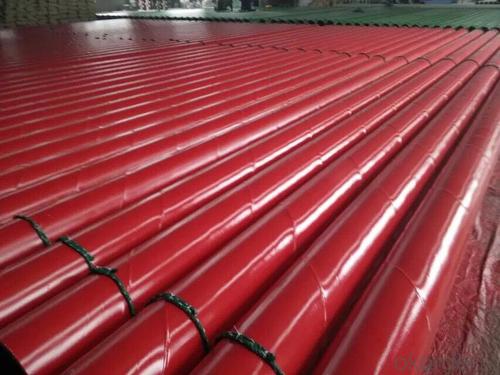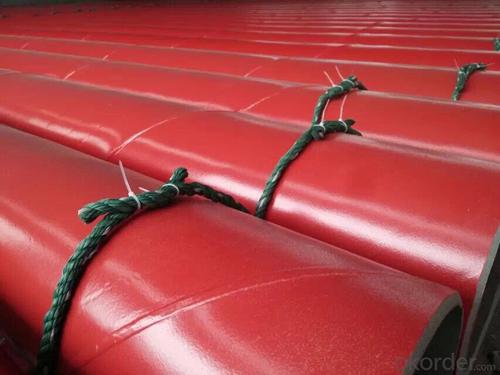SSAW 3PE steel pipe external coating
- Loading Port:
- China Main Port
- Payment Terms:
- TT OR LC
- Min Order Qty:
- -
- Supply Capability:
- -
OKorder Service Pledge
OKorder Financial Service
You Might Also Like
Specifications
water pipeline inner-layer tape
1 Butyl rubber as adhesive
2. SGS test report and DVGW certificate
3. corrosion protection
water pipeline inner-layer tape
State-of-the-Art Pipeline Protection for All Climates & Environments
System description:
WATER PIPELINE Inner -layer tape also be called pipe wrap anti-corrosion tape, polyethylene wrap tape.
water pipeline Inner-layer tapeT100 is engineered to assure a high bond to the primed pipe surface with excellent conformability characteristics, aggressive adhesive for corrosion protection and repair of main line coatings.
Inner-layer tapeT100 series is cold applied tape coating system for corrosion protection of Oil, Gas, Petrochemical, and Waste Waterburied pipeline, pipe can be buried, also can be underground ,overhead ,onshore and offshore .
Structure of water pipeline inner wrap tape
The specification of the tape consists of two layers, adhesive layer and film backing
Adhesive: butyl rubber
Film backing: Special blend of stabilized polyethylene
Features & Benefits
Provides a permanent bond to the primed steel pipes surface and provides protection against chemical electrolytic corrosion for underground pipelines.
long term corrosion protection
Worldwide reference lists. Established in-ground history
High chemical resistance under service temperature.
Outstanding electric property and permanent adhesion.
Cold applied, No release liner. Makes installation fast and easy.
Complies with EN-DIN 30672 and AWWAC-214 international standards and also ASTM standards.
Be used for water pipeline corrosion protection
System Properties
Type | T138 | T 150 | T165 | T180 | T 250 | T265 | T280 | |
Thickness | 15mil 0.38mm | 20mil 0.508mm | 25mil 0.635mm | 30mil 0.762mm | 20mil 0.508mm | 25mil 0.635mm | 30mil 0.762mm | |
Backing | 9mil 0.229mm | 9mil 0.241mm | 10mil 0.25mm | 10mil 0.25mm | 15mil 0.38mm | 20mil 0.508mm | 25mil 0635mm | |
Adhesive | 6mil 0.152mm | 11mil 0.279mm | 15mil 0.381mm | 20mil 0.508mm | 5mil 0.127mm | 5mil 0.127mm | 5mil 0.127mm | |
When used for ductile iron pipes inner layer 980-20 or 980-25 and outer layer 955-20 or 955-25 are recommended. | ||||||||
Elongation | ³300% | ³400% | ||||||
Tensile Strength | 55 N/cm | 70 N/cm | ||||||
Color | Black | White | ||||||
Peel Adhesion to Primed Pipe | 33 N/cm | |||||||
Dielectric Strength | 30 KV | |||||||
Dielectric Breakdown | 26 KV/mm | |||||||
Cathodic Disbandment | 0.24 in radius 6.4 mm | |||||||
Water Vapor Transmission Rate | < 0.1% | |||||||
Volume Resistivity | 2.5 x 1015 ohm.cm | |||||||
Impact resistance | 5.5Nm | |||||||
Penetration Resistance | <15% | |||||||
Performance | AWWA C-209,ASTM D 1000,EN 12068 | |||||||
Order information
Length | 100ft(30 M),200ft(60 M),400ft(120 M),800ft(240 M) |
Width | 2’’(50mm),4’’(100mm),6’’(150mm),17’(450mm),32’’(800mm) |
- Q: What is DN50 for welded pipe?
- Refers to the use of welded steel pipe made of DN50 steel pipe, refers to the inside diameter is 50mm, the market of common DN50 pipe also refers to the 2 inch pipe, standard pipe: 3.5mm thickness, pipe diameter 60mm, the weight of 4.88kg/m theory.
- Q: What are the different methods of pipe threading for steel pipes?
- There are several methods of pipe threading for steel pipes, including manual threading, machine threading, and roll grooving. Manual threading involves using a hand-held die and a pipe vise to create threads on the pipe. Machine threading uses power-driven threading machines that can quickly and accurately create threads on steel pipes. Roll grooving, on the other hand, involves using a specialized machine that forms a groove on the pipe, eliminating the need for threading and allowing for easy installation of pipe couplings or fittings. Each method has its advantages and is chosen based on factors such as pipe size, project requirements, and efficiency.
- Q: What are the different types of steel pipe joints for underwater applications?
- There are various types of steel pipe joints commonly used for underwater applications, including buttweld joints, socket weld joints, and threaded joints. These joints provide secure connections and maintain the integrity of the pipeline system in underwater environments.
- Q: How are steel pipes used in the wastewater treatment industry?
- Steel pipes are commonly used in the wastewater treatment industry for various purposes such as carrying and distributing wastewater, transporting chemicals, and constructing infrastructure like tanks, pumps, and treatment units. The strength, durability, and corrosion resistance of steel pipes make them ideal for handling the harsh and corrosive nature of wastewater, ensuring efficient and reliable operation of the treatment processes.
- Q: How are steel pipes used in the pharmaceutical industry?
- Steel pipes are commonly used in the pharmaceutical industry for various purposes such as transporting fluids, gases, and chemicals, as well as providing structural support for equipment and machinery. They are utilized in pharmaceutical manufacturing processes, including the transfer of raw materials, disinfection, and sterilization procedures, and the distribution of pharmaceutical products. Steel pipes ensure the safe and hygienic transfer of substances, maintaining the integrity and quality of pharmaceutical products throughout the production and distribution chain.
- Q: What is the difference between galvanized iron pipe and galvanized steel pipe? Or called different, in fact, is referred to as galvanized pipe?
- Different materials, cast iron, steel seamless steel pipe; the different production process, cast iron is hot metal casting, steel rolling mill of seamless steel tube is through processing, different performance indexes, ductile iron diameter, wall thickness, crisp texture, relatively heavy, can be made of seamless steel pipe diameter is very small, the wall is very thin, good toughness, light. Cast iron, cheap, but the bottom of the strength, can only be used in low pressure occasions.
- Q: Are steel pipes suitable for underground gas lines?
- Yes, steel pipes are suitable for underground gas lines. They are commonly used due to their strength, durability, and resistance to corrosion, making them a reliable choice for transporting and distributing gas underground.
- Q: What is the role of steel pipe manufacturers in sustainable development?
- Steel pipe manufacturers play a crucial role in sustainable development by promoting environmental responsibility, resource conservation, and reducing carbon emissions. They contribute to sustainable development by adopting cleaner production techniques, recycling waste materials, and investing in research and development to improve energy efficiency. Additionally, they prioritize worker safety and adhere to stringent quality standards, ensuring the durability and longevity of their products, which further supports sustainable construction practices.
- Q: Are metal spiral tubes the same as metal bellows?
- The corrugated pipe is extruded by the extruder, the winding pipe is wound in a circle, and the prestressed metal corrugated pipe is a reserved channel.
- Q: What is PE coated steel pipe? Seek explanation
- PE pipe is a kind of thermoplastic resin with high crystallinity and non polarity.
Send your message to us
SSAW 3PE steel pipe external coating
- Loading Port:
- China Main Port
- Payment Terms:
- TT OR LC
- Min Order Qty:
- -
- Supply Capability:
- -
OKorder Service Pledge
OKorder Financial Service
Similar products
Hot products
Hot Searches
Related keywords




















